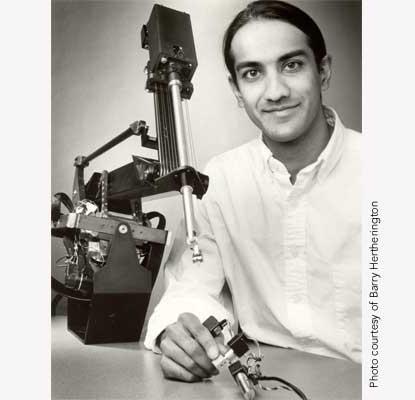Akhil Madhani
Adapting robots to a variety of environments—from the operating room to theme parks to Space—Akhil Madhani has flourished on the frontier of Artificial Intelligence. Madhani was awarded the $30,000 Lemelson-MIT Student Prize in 1998 for his clever developments in robotics, such as the Black Falcon—a tool for minimally invasive surgery.
As a result of working in the MIT Artificial Intelligence Lab and observing his father, an orthopedic surgeon, perform an arthroscopy, Madhani invented the Black Falcon—a robot with a long cylindrical arm, a small wrist and tongs to facilitate minimally invasive surgery. Operated by a joystick, the device enables a surgeon to make a one-inch incision with its tongs to manipulate tissue, suture and tie knots—comparatively reducing the size of the cut and patient trauma. Still undergoing testing, Madhani's breakthrough is a vital evolution of surgical procedures that have had limited modifications since their development many years ago.
Madhani's earlier inventions include the Talon—a robotic wrist and hand system for remote autonomous exploration, developed for a NASA-sponsored program. This creation stemmed from Madhani's "WAM", a robotic whole arm manipulator that can throw and catch a ball.
In addition, Madhani co-developed a robotic head/eye system to study human and computer vision as well as new software tools to design multi-limb mobile robots for hazardous clean-up and rescue tasks.
Growing up in Seattle, WA, Madhani was a child who enjoyed building and designing toy cars, boats, planes and rockets. He received his BS in mechanical engineering from UC Berkeley, followed by his MS and PhD (1997) in mechanical engineering from MIT. Sharing his passion for robotics with younger kids, Madhani has served as a design instructor with the MIT MITE²S (Minority Introduction to Engineering and Science) summer program, which challenges high school teams to build a device to complete a goal-oriented task.
Upon graduating, Madhani accepted employment at Walt Disney's Imagineering Research and Development Laboratories in Glendale, CA, where his first project was to develop an experimental 11,000 pound walking machine with a team of engineers. According to Madhani, "The Lemelson-MIT prize reinforced my desire to build and create, and gave me further confidence to pursue risky projects—to know that there is payoff for all the years of work."


